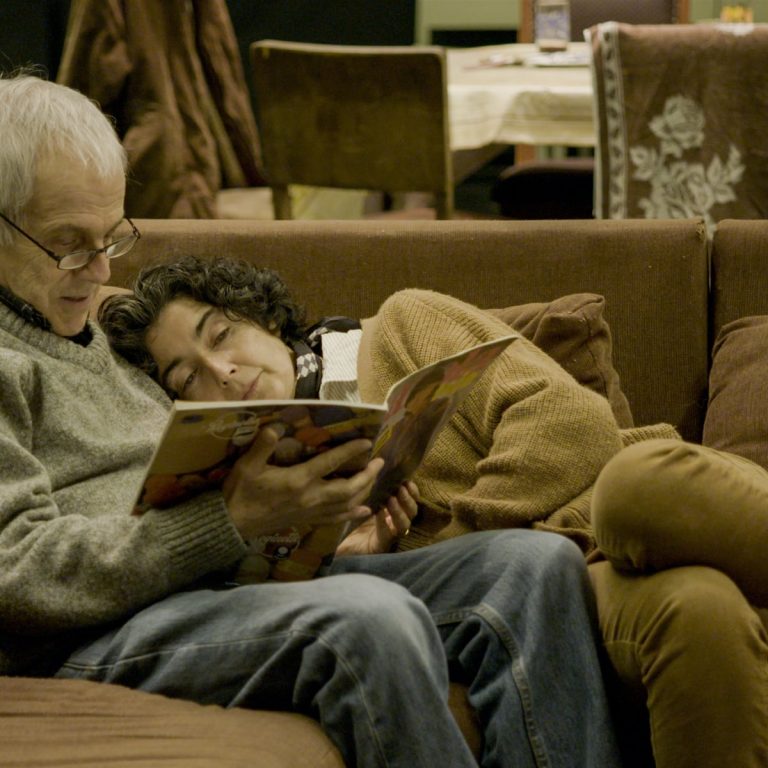
“You Can’t Delete The Pain Of A Country, That’s The Story You Have To Tell.”: Maite Alberdi On Oscar-Nominated Doc ’The Eternal Memory’
08 March, 2024Maite Alberdi is an Academy Award nominee. Given that of the nearly 14,000 Oscar nominees since 1929, only 17% were women, Alberdi is amongst a select group. What’s more, she has received the distinction twice. This weekend her film, The Eternal Memory (La memoria infinita) will be competing for the Best Documentary Feature at the 96th Academy Awards. A win would make her not only the first Chilean woman to be nominated, but also the first to take home the award.
The Eternal Memory is an intimate study of a couple’s evolving relationship after one of them is diagnosed with Alzheimer’s disease. The film premiered at Sundance in early 2023 taking the Grand Jury Prize for Best Documentary, and was released in Chile in August, shortly before the 50-year anniversary of the coup that ended democracy in the country for nearly 17 years. It received the biggest opening of any documentary feature in Chilean history, joining the success of other Chilean films such as Pablo Larrain’s No, Andres Wood’s Violeta Went to Heaven and Sebastian Leilo’s Gloria and racking up over 200,000 tickets in its first month at the box office.
Sounds and Colours caught up with Alberdi during a Filmmaker’s Afternoon Tea at the last BFI London Film Festival to discuss her latest film.
The Eternal Memory follows the final years in the relationship between Augusto Góngora and Paulina Urrutia – two key cultural figures in Chile –as they navigate his illness. Augusto (who passed away in May 2023 at the age of 71) was a prominent journalist, filmmaker and TV presenter in Chile. He put himself at risk to report on the reality of life during the Pinochet dictatorship. In the UK, his documentary, La esperanza incierta (The Uncertain Hope, 1991), examining the transition to democracy in four Latin American countries -including Chile – was broadcast by Channel 4’s as part of the series South. Góngora became an influential figure in public television in Chile after the dictatorship ended. “I grew up watching Augusto’s cultural programmes which were the only ones that existed on public TV.” says Alberdi. Paulina Urrutia, his partner of 25 years, a successful actor and Culture Minister under Michelle Bachelet’s government during 2006-10, became his full-time carer when Góngora was diagnosed with Alzheimer’s at the age of 62.
Góngora was open about his reaction to hearing the news. In an interview for El Mercurio’s Revista Sabado, he’d said: “I cried and cried the day I was told I had this disease, I left the doctor’s office and the only thing I did was cry.” Three years later, Alberdi met the couple at the university where she was teaching, and where Urrutia was also working.
“I realised that he always came with her to work, and that everyone that worked with her was used to Augusto being with her at work. It was the first time I saw someone with dementia who wasn’t isolated socially and was living in the world and totally integrated into it. They seemed in love and the Alzheimer didn’t seem a problem. That love and that ability in their relationship surprised me so much that I invited them to make a film about their relationship. It was totally about how they dealt as a couple with the Alzheimer.”
Alberdi filmed the couple for five years, stopping shortly before Góngora passed away. The film documents his decline, but is also a joyful portrayal of the profound love the couple shared, and looks at their relationship in the context of both theirs and Chile’s past. “For me it wasn’t a film about forgetting, it was a film about what one always remembers.” Says Alberdi, who describes how she was struck by the fact that Góngora not only remembered the dictatorship, but also his loves and his losses: “I realised I had to take charge of that memory that remained and make a link with the archive and a link with the history and that was a discovery in the edit room of being able to give it a dimension of the narrative present.”
Having been born in 1983 during the dictatorship and with the number of films made in Chile exploring that period it would have been easy to catalogue Alberdi’s film as another take on the dictatorship. When asked if she felt a responsibility about treating the subject. Alberdi says: “For me it was never a film about the dictatorship. It’s a film about love and a loving relationship and in the context of Alzheimer, the dictatorship was a layer, a phase that they had lived through. Augusto doesn’t remember facts but the pain of the dictatorship is still there. You can’t delete or reinterpret the pain of a country, that’s the story you have to tell. “
Alberdi made two other films focussing on older generations, The Mole Agent (El agente topo, 2020) and Tea Time (La once, 2014), before embarking on The Eternal Memory.
She says: “I’m attracted to exploring those phases that we are all scared of. I believe my challenge is to not be afraid of fragility, that’s what I’m trying to show and explore in my films.”
The Eternal Memory is available to watch on the BBC iPlayer. The 96th Academy Awards will take place this Sunday 10th March. You can read our review of The Eternal Memory here.
Follow Sounds and Colours: Facebook / Twitter / Instagram / Mixcloud / Soundcloud / Bandcamp
Subscribe to the Sounds and Colours Newsletter for regular updates, news and competitions bringing the best of Latin American culture direct to your Inbox.

